Editor Mrigaa Sethi is 37 years old and happily married to her wife of two years, Erin Sweeney. It is a union celebrated by her parents, relatives and friends. But the journey towards this contented present was decades in the making. For a long time, Mx Sethi’s parents had struggled to accept their only child’s identity as a nonbinary queer person.
Mx Sethi’s mother, Bonny Sethi, 58, shares that her child had shown signs of being queer since young. “She never played with dolls. She watched… He Man, Ninja Turtles and so on. She hated wearing frocks and dresses,” she recalls.
“When Mrigaa was about 10 years old, I reprimanded her for choosing jeans over a dress for a birthday party. She burst into tears, and said, ‘Mama, I don’t feel like a girl,’” Mrs Sethi shares: “I felt I had been punched in the stomach. That time I just hugged her and cried with her.”
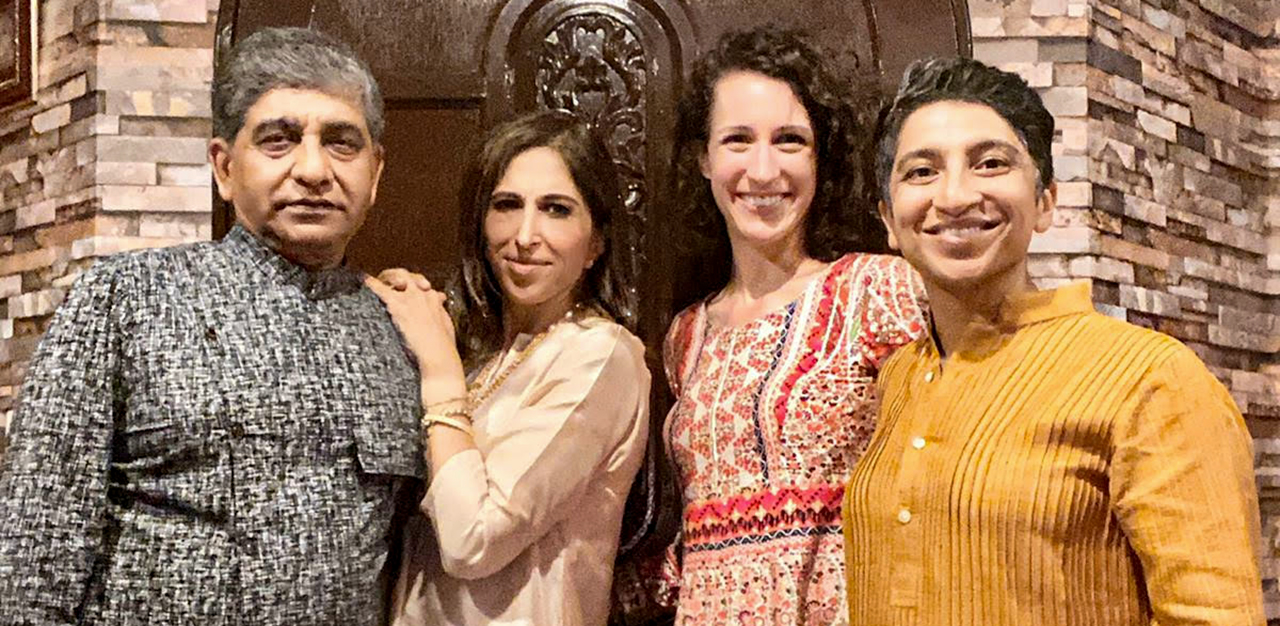
Her worst fears were confirmed when Mx Sethi’s teachers – who were also Mrs Sethi’s colleagues, since she was teaching at her daughter’s school at the time – shared that Mx Sethi had “come out” to everyone at their eighth grade school advisement trip. Mr Sethi was so grief-stricken by this news that he “slept in a foetal position for weeks after that, moaning in his sleep,” she says.
“My husband thought we had nothing left to look forward to. No grand Indian wedding for our only child, and most importantly, no grandchildren. He slumped into a huge depression.”
Mrs Sethi attributes their dismay towards her child’s gender expression to a very conservative upbringing, and a fear of what her community would think. “I honestly believed people looked at me differently and were mocking me behind my back,” Mrs Sethi explains. “It was simply, ‘What will the world say,’ syndrome.”
For a long time, these anxieties caused a lot of tension in the Sethi household. Looking back, she recollects: “My poor girl had to go through a lot of outbursts and verbal lashings from us both.”
A turning point
When Mx Sethi left home to live on her own, Mr and Mrs Sethi saw it as a huge blow to them, and this had made them “re-evaluate our thought processes”, notes Mrs Sethi. They started coming to terms with their child’s sexuality after Mx Sethi had been working for a while after graduating from university. Mrs Sethi credits Mx Sethi’s past girlfriends for changing her perception.
“When I saw them together, happy, cheerful, and content, I felt this huge sense of warmth towards them both. I found myself visiting them, and having them over,” explains Mrs Sethi. “[Her then-girlfriend] made my child so happy, and was so loving and respectful towards us. This, I guess, led to the culmination of our years’ struggle with it all.”
The positive relationships that Mx Sethi had motivated Mrs Sethi to recognise that her daughter was happiest when she could freely pursue the relationships that were truest to her identity.
“My girl is now happily married to this absolutely amazing girl for two years, and they keep a beautiful home together… Erin has brought out the best in our child, and is extremely dear to our hearts,” Mrs Sethi gushes.
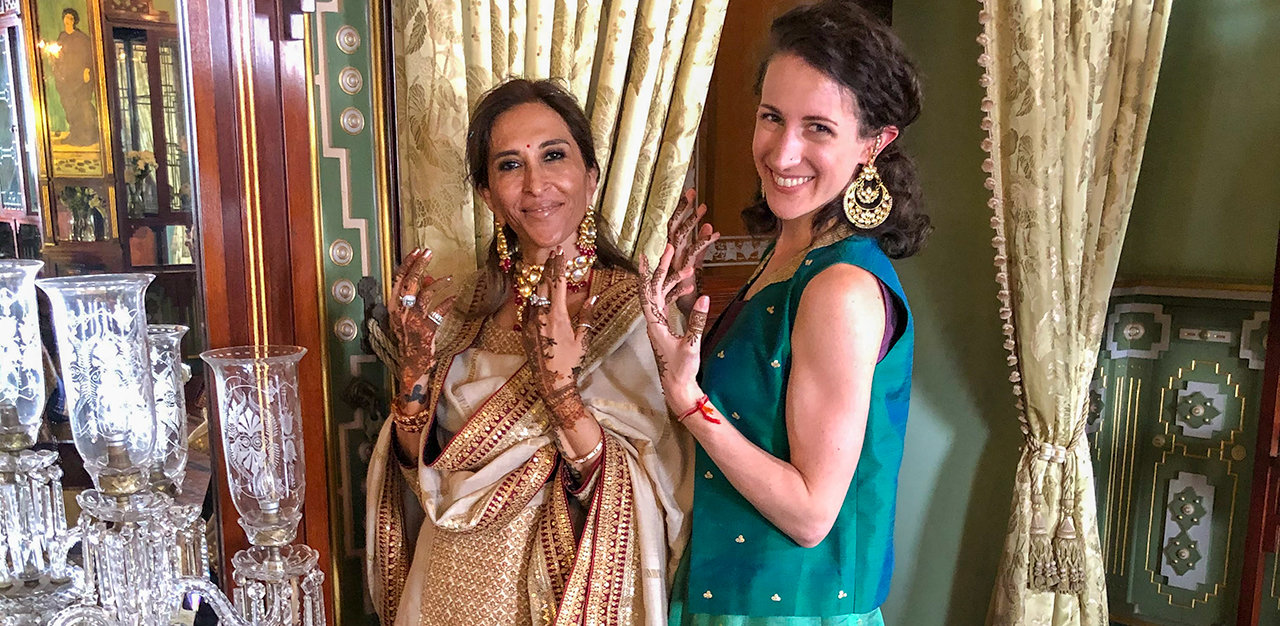
A community’s welcome
Both Mrs Sethi and Mx Sethi were “totally astonished at how accepting they were”, when Mrs Sethi finally mustered the courage to come out about her daughter to her immediate family and close friends.
Proof of this came during Mx Sethi and Ms Sweeney’s first Deepavali as a married couple, in 2019. They visited their parents in Bangkok for the occasion, where they were received at a party with over a hundred friends and family. Mrs Sethi brought the couple from table to table and introduced her daughter-in-law to her community.
“Everyone was really nice and kind, and they treated us just the way you would treat any sort of newlyweds,” recalls Mx Sethi. “It was kind of surprising to realise that the community response that we feared never really came in that same way. Or [perhaps] the community was waiting for us to take the lead on how to respond.”
On this, she reflects: “The vibe that we put out in the community is the vibe that we get back – at least in this case.”
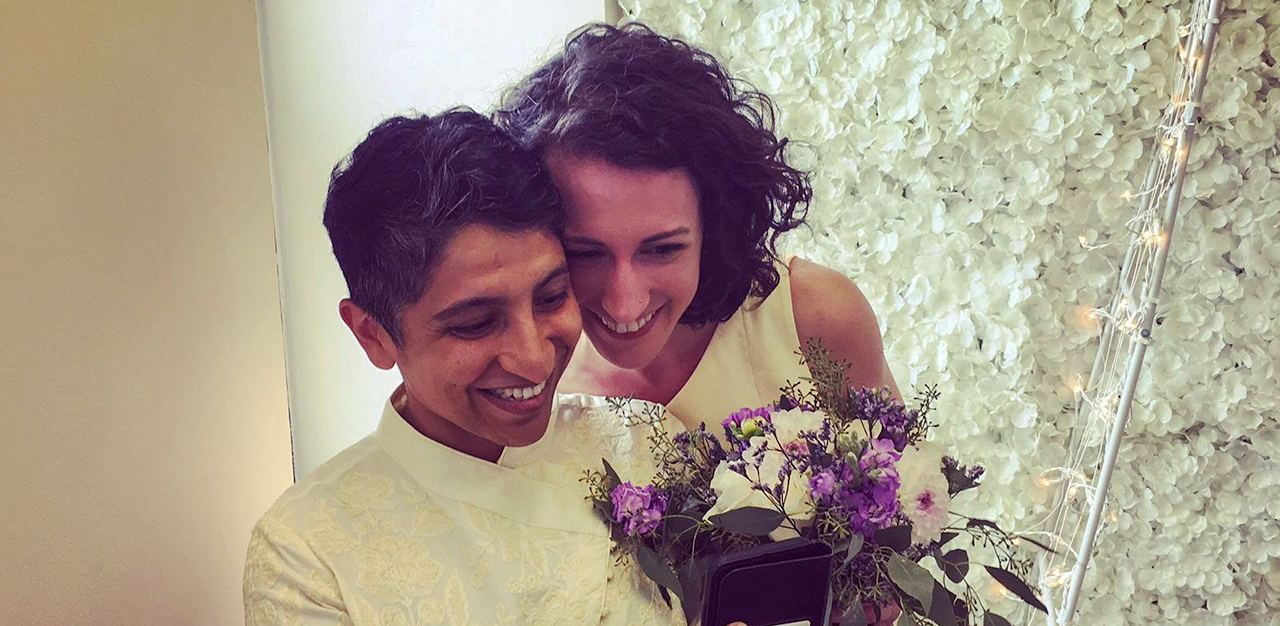
Challenges of coming out in Singapore
While Mx Sethi’s story has a happy ending, many LGBTQIA+ individuals in Singapore hesitate to come out to their family for fear of rejection, or have faced negative consequences after doing so.
Alexander Teh, a youth worker at non-profit Oogachaga, says: “In Singapore, where the concept of filial piety and a lifelong bond with parents is instilled in us from a young age, it is incredibly difficult for LGBTQIA+ people to deal with the lack of support from their parents, especially if they had a good relationship with them to begin with.”
Yet it is precisely this support that LGBTQIA+ youth need as they navigate a world of uncertainty.
“It is natural for many of us to look to our parents for comfort in stressful situations, and for validation in times of self-doubt,” Mr Teh says.
“Supporting their children regardless of their sexual orientation, gender identity or gender expression will let them know that even if their experiences outside the home are not the best, they can always come back to a space where they know they are safe and loved,” he emphasises.
This sense of fear and anxiety might be due to the generally conservative timbre of Singapore society. According to a 2020 survey by the Institute of Policy Studies, 59.3 per cent of 2,000 Singaporean and Permanent Resident respondents say that homosexuality is never or seldom justifiable.
For LGBTQIA+ youths who come from a conservative or religious background, coming out to their families can entail real risks of disownment and homelessness.
Coming out is only a first step
But even when the situation is not as dire, some members of the community caution that coming out is merely the first step in a long process towards mutual understanding.
Freelance deep tissue therapist Eileena Lee, 50, was one of the first people to publicly come out during Pink Dot, in 2010. Ms Lee encourages fellow LGBTQIA+ individuals to “be very gentle with our expectations”, when coming out to loved ones.
“My mum struggles still, with me,” she says. “I’ve come out to her for so many years… But people do vacillate, and children need to know that their parents will vacillate.”
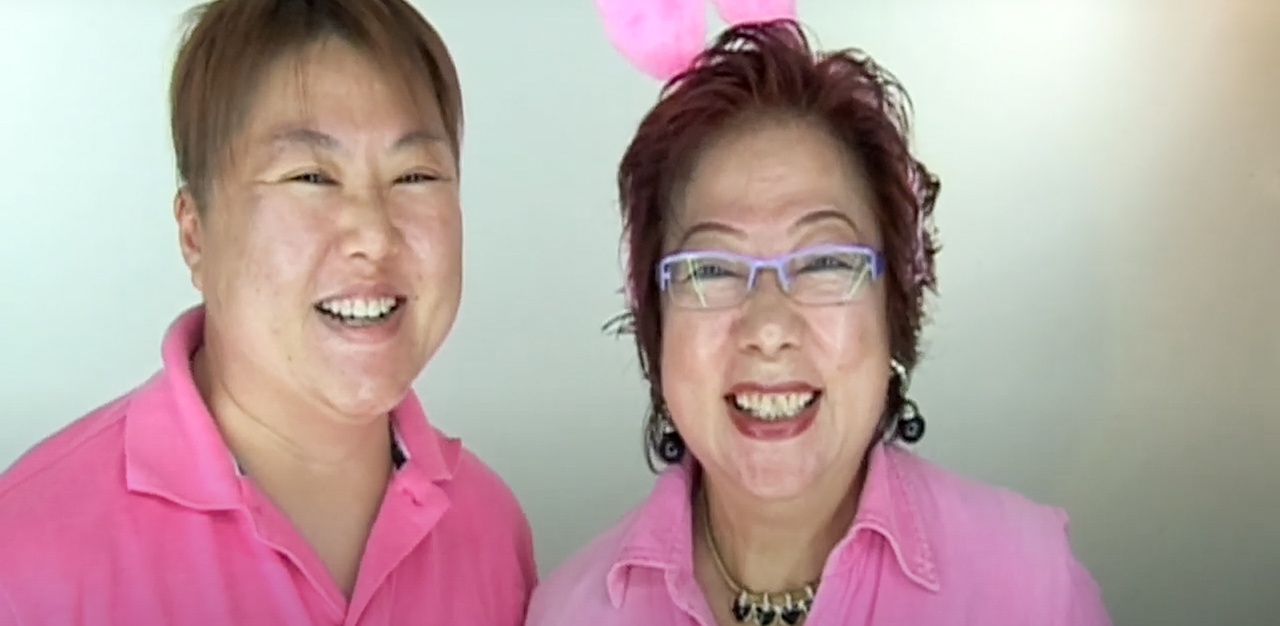
She urges queer and trans individuals, as well as their family members, to view “coming out [as] the start of a long conversation of getting to know each other better.” She also encourages the former to consider educating their family members on LGBTQIA+ issues to nudge them towards acceptance.
Under the watchful eyes of statutory board Infocomm Media Development Authority, which regulates media content in Singapore, there has been, historically, a dearth of realistic and positive LGBTQIA+ representation in mainstream media. A lack of exposure might have led to the general public being largely unaware of or misunderstanding the lived experiences and struggles of LGBTQIA+ individuals. These consequences contribute to the challenges of coming out to family and friends.
For parents who are older or non-English speaking, such as Ms Lee’s mother, “it is hard for her to go and search for queer-affirmative information,” she says. It is thus important to “create space for them to just be.”
Explains Ms Lee: “Imagine when you’ve just come out to yourself, I don’t think that the love for yourself happened immediately, right? Our parents need to go through that…[and] come out too. It’s a huge step for them.”
Loved ones have to grapple with coming out too
Family members of queer and trans individuals have to negotiate their own comfort levels with coming out to their colleagues and friends, as they find their footing in supporting their LGBTQIA+ loved ones.
Fine art consultant 29-year-old Christian Dawn (not his real last name) identifies as a trans man. He has lived with his main guardian, a 74-year-old aunt who teaches at a local primary school, since he was born. Though ‘Auntie’ Anne is fully supportive of her transgender nephew, she declines to share her full identity for this article due to concerns that her workplace would draw ire from conservative parents. Otherwise, she continues to be Mr Christian’s staunch supporter when faced with probing questions from colleagues and family members.
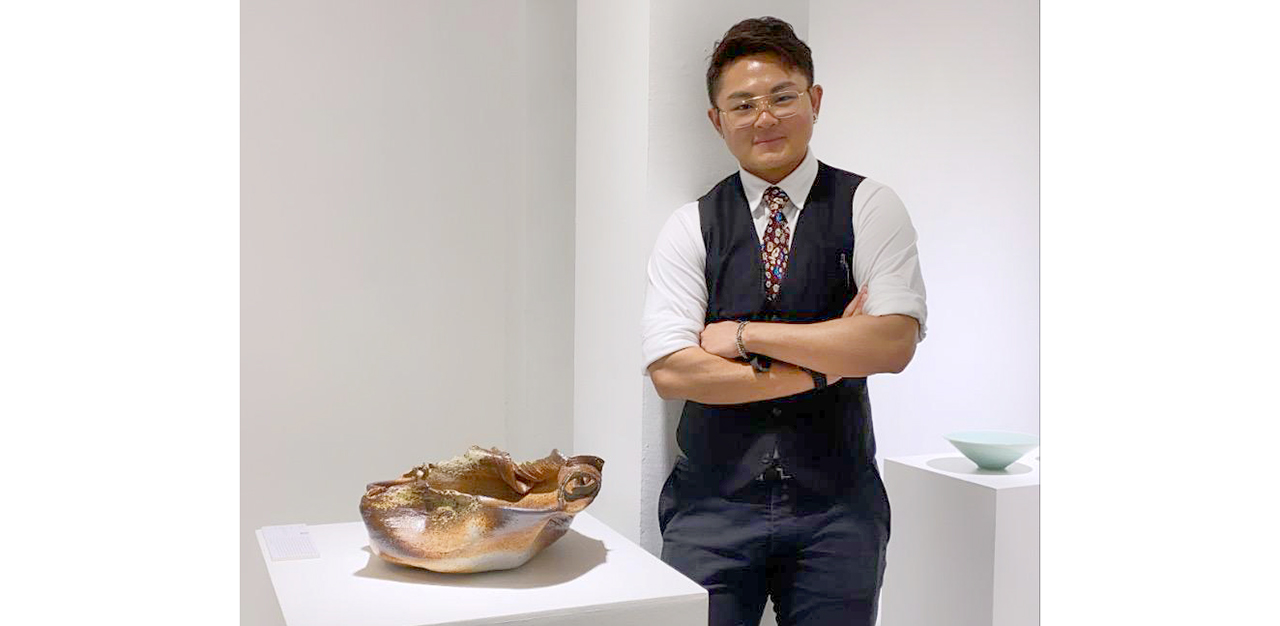
Mdm Anne is no stranger to navigating difficult conversations in the workplace.
She says: “Some close colleagues in school have asked me, ‘What happened to your niece?’ And I’ll say, ‘Nephew, you mean’? And that’s it, they won’t ask any further.”
A simple correction like this, while brief, speaks volumes about her affirmation of and support for Mr Christian’s gender identity.
Although a devout Catholic, like her nephew, she does not see religion as coming between her and her love for him.
“My understanding of God is a very magnanimous one,” she says. “It’s human beings that narrow him down to be a very narrow-minded God.”
Besides, she adds, only God can be the judge: “All of us have our own choices to make… and if we are chosen to be this, for whatever reason, no one can judge.”
A supportive family is a safe space
Mr Christian’s case might be an unconventional one. As he puts it: “I didn’t come out to my family; they came out for me.” Before he had mustered the will to come out to them, his closest relatives had already deduced his gender identity themselves.
“Even as early as when I was 11 or 12, my grandmother already asked me, in dialect, if I liked girls,” he says.
For him, his aunt and late maternal grandmother were the refuge that he could count on for support, when other members of his family were less understanding.
“When my grandmother was alive she would tell the whole extended family and my own mother off for gossiping about me at the reunion dinner,” he shares. “She’d say, ‘So what if Chris likes girls? Chris is the most filial grandchild that I have.’”
At each stage of his journey – first as a butch lesbian and then as a trans man – his instinct had been to hide his struggles with his sexual orientation and gender identity. He was afraid of how his family would react. But the unwavering support of his aunt and grandmother made him realise that “at the end of the day they’ll still love [me] no matter what. And it took me some time to realise that.”
Family members who extend this love and support to others in the community provide a safe space for LGBTQIA+ youths, who may not be welcomed in their own homes.
For 29-year-old Ashutosh, who identifies as gay, his mother has also been a maternal figure to his queer friends whose parents are unsupportive. “I don’t feel the need to hide anything from her and she’s met ex-boyfriends and welcomed them with open arms,” he shares.
Mdm Usha, his mother, says that having a gay son has enabled her to learn about the LGBTQIA+ community. “My advice to other parents [is that] accepting your child is the way to go,” she urges. “If we were to put ourselves in their shoes, we would feel the real pain. Wouldn’t we all want people to accept us for what we are and who we are?”
Resources to look up
For those who are struggling with their child’s queer identity, there are more avenues than ever to seek information and support.
Longstanding queer-affirming spaces, like Oogachaga, provide counselling services, while Pelangi Pride Centre is a resource library, with a range of fiction and non-fiction books of LGBTQIA+ interests. Oogachaga also has a section in their online resource library that includes information tailored to parents and families of LGBTQIA+ individuals.
Now in its 13th year, Pink Dot SG, Singapore’s first public, open-air pro-LGBT event, has become a rallying point for LGBTQIA+ and allies to show support for the queer community. It is not uncommon for queer individuals to bring their friends and family to introduce them to a positive and unifying experience of the queer community.
Over the years, this national movement has amplified the message that everyone deserves the freedom to love. It has also spot-lit queer families; their joys and challenges, while remaining one of the only large-scale events where Singapore’s LGBTQIA+ community can see itself reflected in an open and inclusive light.
In the social media space, a number of queer-affirming pages have sprung up in recent years. Some examples include:
- @heckin.unicorn – a queer-affirming accessories brand with a blog that covers local LGBTQ+ issues.
- @myqueerstorysg – an Instagram page that collects and shares stories of discrimination against the local LGBTQ+ community.
- @quasasg – a non-profit queer Muslim peer support and resource collective on Instagram.
Given an increased visibility, support and availability of resources today, one might argue that it is easier to come out now than it was for older generations.
Ms Lee, who is also a co-founder of Pelangi Pride Centre (PPC), notes that the landscape and needs of the community has changed over time.
“In the past, the people who come to us when they need resources tend to be LGBTQI individuals,” she says. “In the last couple of years, we are seeing parents together with their kids come to PPC.”
Coming out remains a deeply personal choice
As times change, perhaps it will become easier for parents of LGBTQIA+ individuals to embrace and celebrate their child’s full self-identities.
Until then, it is up to each individual to decide if and when they want to come out to their family, friends and colleagues. And it is not to be taken lightly.
For many, coming out about their gender identity and sexuality can entail real threats to their physical safety and mental health if their home, work, or schooling environments are unsupportive.
Ultimately, there is no right or wrong decision, but only what is best for the individual.
As for family and friends of LGBTQIA+ individuals who want to support their loved ones’ coming-out journey, Mrs Sethi advises: “The best thing you can do is remember that, regardless of [their] sexual orientation and gender identity, you love them and want them to be happy.”
And look how well this advice has turned out for her family.














